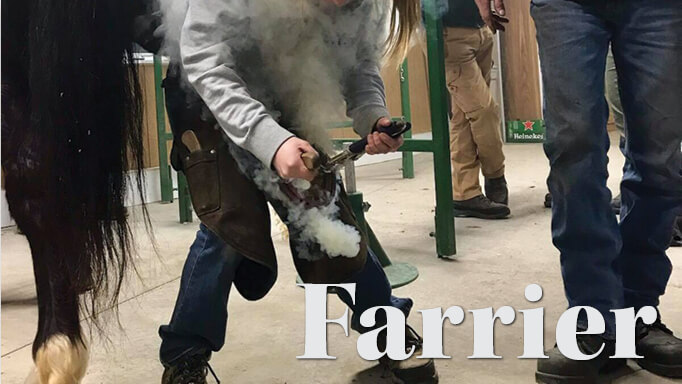No matter what kind of horses you have or what you do with them, one thing is universal: they need their hooves trimmed regularly and in many cases they need shoes.
While in the past the local blacksmith shod horses when he wasn’t busy making iron pots, tools, nails, and the like, today’s farrier is a specialist and an expert in equine hoof care. He or she has studied equine anatomy, biomechanics, lameness, and hoof health, and knows how to adapt the work to the varied needs of different types of horses. Chances are they are a self-employed professional who also has to juggle the business end of things including appointments, finances and accounting, buying supplies, getting the truck repaired, and so on.
Typically, a young man used to apprentice for years under an experienced farrier, gradually learning the profession and eventually taking over when the older man retired. Today, the future farrier goes to a specialized school, becomes certified, and probably works for a couple of years for an experienced farrier before striking out on his or her own.
The average yearly salary for a farrier in Canada is estimated between $34,000 and $50,000. There are several schools offering farrier courses across the country:
- Kwantlen Polytechnic University, BC: 9 months, $800 tuition + $2,000 in tools
- Olds College, AB: 1 year, $5,640 tuition + $3,575 in books and tools
- Prairie Farrier School, SK: 5 months, $7,200 tuition
- Professional Farrier Apprentice Education, ON: 12 weeks, $6,500 tuition
- Institut de technologie agroalimentaire de la Pocatière, QC: 624 hours (in French), $5,750 tuition
- Maritime Farrier School, NS: 8 weeks, $7,500 tuition
I sat down with certified journeyman farrier Luc Gazaille of St. Blaise, Quebec, who has been in business for 28 years, and Vanessa Feidler, a recent graduate of the farrier program at the ITA de la Pocatière, to get their take on the profession.
What made you decide to become a farrier?
Luc: I wanted to work with horses and make them comfortable.
Vanessa: I have my own stable, so it’s an advantage to be able to trim and shoe my horses rather than paying someone else to do it.
What kind of farriery training do you have?
Luc: I took an introductory course to begin with, then I apprenticed with several experienced farriers before heading out on my own.
Vanessa: I completed my course in June 2018. Since then I’ve worked with three experienced farriers to learn more. I don’t consider myself a farrier yet, but rather an apprentice.
What are the greatest advantages and disadvantages of working as a farrier?
Luc: Being my own boss, choosing my schedule, and of course working with exceptional animals are the greatest advantages. I love being able to improve a horse’s quality of life, talking with owners, trainers, and other professionals. The worst part would have to be working with uneducated horses or in unpleasant or even dangerous conditions.
Vanessa: The flexible hours and work loads are great. The nicest part is meeting new horses and their owners. The disadvantages are probably the lack of adequate installations in my region, and also the weather, when it’s really hot or really cold. The worst part would be when horses are undisciplined; they can make our work difficult and dangerous, too.
What does a typical day look like for you?
Luc: I usually start around 8:00 a.m. and work until lunch time. I take a break, and then work again until around 4:00 p.m. When I get home, I answer calls and make appointments for the following week.
Vanessa: I try to organize my schedule at the beginning of the week so I spend the least amount of time on the road. Otherwise the days can be really too long!
Is it important to keep up-to-date by attending farrier workshops, conferences, etc.?
Luc: Of course. I continually learn by reading, attending conferences, and talking with other farriers.
Vanessa:Yes, it’s important! The farrier’s profession is so vast and no two horses are alike.
Is the work difficult physically?
Luc: It is, especially for the knees, elbows and back. You need to know a good massage therapist and chiropractor (laughs).
Vanessa: Yes, but it helps if you train to strengthen the necessary muscles and you have good posture and good tools.
What advice would you give to someone thinking about becoming a farrier, and can a woman do the job as well as a man?
Luc: You need to be passionate and develop your ‘horse sense.’ As for the second bit, I think it’s more a question of personality than whether you’re a man or a woman.
Vanessa: Of course a woman can do the job! (feigns indignation). We need to get away from old stereotypes.

